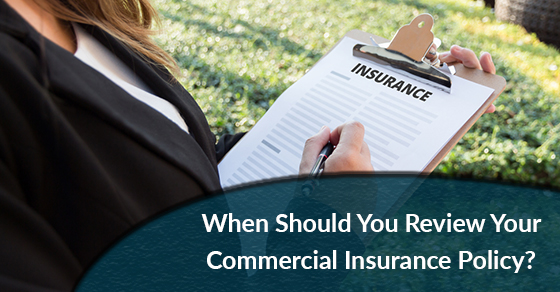
When Should You Review Your Commercial Insurance Policy?
Many people make a note to review their home and life insurance policies regularly but neglect their commercial policy. As a business owner, it’s your job to determine whether or not your deductible needs to be raised or reduced, which is something that probably crosses your mind often. If you’re going to think about your deductible, why not review your policy while you’re at it?
When and how often should you sit down with your broker/insurance agent? It’s general practice to sit down with your insurance broker yearly and discuss your policy, but are yearly reviews enough?
Reviewing your policy: Why yearly reviews might not cut it
Depending on the size of your business, the industry in which you operate in and the number of employees you have, a yearly policy review could be just enough. For instance, if you run a small shop that doesn’t require heavy equipment and only has 2-4 employees, a yearly review will be sufficient. However, there are many foreseen (expansion, relocation) and unforeseen (partner retiring suddenly) circumstances that will arise that may require you to sit down with your agent and discuss your policy before year’s end.
When to review your commercial insurance policy
No matter when you meet with them, your insurance broker will go over every detail of your policy to ensure that it is still providing enough coverage for your business operations. There are certain events that will dictate when you should review your policy:
- Expansion: If you are moving your business operations to a larger space, taking on more employees or creating new departments, you will need to review your commercial policy. Also, if you are expanding to another city, province or even country, you need to sit down with your broker because your current coverage may not be applicable in a new area.
- Downsizing: Less commercial space may require less coverage. Also, when downsizing you may be getting rid of entire departments or certain members of your staff whose roles have become obsolete. This would be a great time to meet with your broker and discuss your policy and reduce the amount of coverage you have.
- Hiring new employees: Make sure all new hires are covered are drivers under your auto insurance policy. Additionally, if you are hiring freelancers or contractors to work on- or off-site,your broker may have advice on how to screen and choose to work with the right professionals.. These insurance contractors or freelancers may have their own insurance, but you should still check with your broker.
- Changing your business model: Moving your business online? Switching to an automated service? No matter what is changing within your business model, your insurance should change with it.
- New equipment: Whether you are buying or leasing new or used big-ticket items, your insurance policy must reflect that. The value of your equipment list may need to be adjusted. You broker may advise in a change in coverage to ensure breakdown, short circuit, etc., protection , or if you can replace it for the same value as purchased or rented.
- Company cars: All company cars must be insured. If you are purchasing a new vehicle for yourself or employees, your policy must be updated. Depending on your business, the vehicle may be insured through commercial auto policy or under a fleet plan.
- Seasonal business: Companies that operate seasonally can benefit from reviewing their insurance policy at the end of every work season.
- Throwing a special event: If you are throwing a special company-wide event to launch a new product, celebrate a milestone, etc., whether it is off-site or on the business’s premises, you should consider Event and Party Alcohol Liability protection.
- New partner, board member or key person comes on board: When your company takes on new additions to key personnel, it’s time to meet with your insurance agent to revamp your policy. All new partners, board members and key personnel need to be covered the same way you are.
- When key personnel leaves: As you would when key personnel join your team, you’ll need to renew your policy when they leave. If a partner quits or passes away, sit down with your commercial broker and update your policy.
- When you leave the company: If you leave the company but the company is going to carry on without you, meet with your insurance agent to get yourself removed from the policy.
- When you sell the company: Treat leaving the company the same way as selling the company and make sure your name is no longer on the insurance policy.
Commercial insurance is put in place to protect you, your employees and your business. At W.B. White Insurance, it’s our goal ensure you have the best products at the best price to keep your enterprise up and running. Contact us for more information.
Leave A Comment
The comments are closed.


